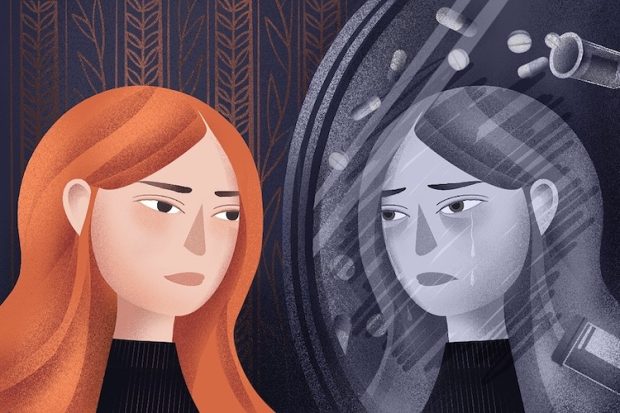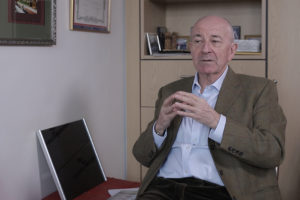Self-aware Networks
Computer scientist Erol Gelenbe on the idea of AI self-regulation, the goal function of a network and whether ...
Douglas Adams, the English science fiction writer, said: ‘Technology is stuff that doesn’t work yet’. The problem with lots of technology (or things that we encounter in the world that we call technology) is that it’s now begun working: when we break down on a motorway, we reach for mobile phones, and we’re almost certain that we have it there, and it becomes a sort of an important part of our safety routines. So our relationships with these things that we call technology are changing, and we’re becoming more reliant on computers as everyday objects that really inform and help us with the activities that we’re engaging in.
So, it’s becoming hard to ignore that technology is really infiltrating the world of emotional health, and counsellors have to engage with this as a topic. I think, whether we like it or not, therapists are engaging with technology in the therapy room. This can take a multitude of forms. Some of it may be clients who talk about problems that they may have encountered, like cyberbullying, so the technology is the issue that they’ve come to talk about. I think of one of the clients I had who bought a phone and started showing me pictures of a loved one who had recently died, and it was a way of them sharing some of their connection with that person in the real world. This was in face-to-face communication, so it was even within the realms of how counsellors traditionally work and have traditionally worked: there is technology creeping in.
Historically, we can see even within Freud’s work, he used to write letters to some of his clients. So I think we have this feeling that it’s something new, but actually, I think it has a legacy that goes back way beyond. Even in the current history, during the 1960s, people were creating computer programs that mimicked person-centred counselling, or they were creating tape recordings that offered guided self-help from a more cognitive behavioural frame. Technology has had its place in history for quite a long time, and it’s continued to grow; if we look at countries like England, it’s now become one of the recommended treatments.
If you go to a GP and present with low mood and get a diagnosis around depression, your prescribed treatment may be to have computerized cognitive behavioral therapy as one of the recommended treatments by the Health Service.
So this has become really big business and kind of an important part of what’s happening within the therapeutic world and something that we can’t ignore. I think it’s infiltrating all different forms of communication online, so computer-mediated communication via common means such as email or synchronous communication, which is chat rooms and things that happen in a more immediate fashion are becoming commonplace, and practitioners will often offer these services as an additional service to their maybe face to face service.
We’re also seeing group support in online forums and then developments in the world of avatars and computer programs or websites such a Second Life beginning to have therapeutic presences. We need to always stay ahead of the game of the virtual reality headsets that are now starting to come into people’s awareness and will inevitably become part of the therapeutic culture where we’ll be able to offer almost a virtual reality therapy setting. We’re already seeing that for some treatments of trauma, particularly with military veterans, people are using immersive techniques to really support them in overcoming the traumas that they have suffered on the battlefield.

So these technological developments are here, and without doubt, they’re here to stay, and counsellors or therapists need to stay abreast of that with a view to remaining confident or developing their own competence at communicating in these ways and being confident in their own competence. For many years, I think organizations and training programs have been supporting counsellors to learn how to communicate and have emotional conversations solely via text, so using things like emoticons or abbreviations and paying attention to some of what might be viewed as non-textual communication, almost the speed that someone may have in responding to a particular email may give us an insight into their well-being. One author talks about the idea of Freudian typos as opposed to maybe a Freudian slip where people can kind of communicate and give things away in the text. Therapists have to attune themselves and develop these different skills as a way of taking their traditional skills of developing a relationship face-to-face and then being able to transport that into an electronic means, whether or not that’s email, chat rooms, using a videoconference package, etc.
And that’s challenging, I think, for some counsellors. I think, typically, therapy has been about becoming a very intimate relationship between two people within a room and taking it into the realms of technology seems to put an immediate distance between two people. So, really, these skills become important for us to be able to transfer these relationship skills and then apply them within a more virtual or electronic round.
The good news, I think, if you can look at the research around this topic, is that despite the apprehension or the reticence from counsellors, the feedback from clients and counsellors who work in this area is that it is actually possible to create strong therapeutic alliances online.
The outcome studies, although there are by no means as many as there are related to face-to-face therapy, and it brings a whole new meaning to the idea of trying to control a therapeutic experimental design, but the studies that have been conducted suggests that there are lots of positive outcomes occurring online and that strong therapeutic alliances and relationships can be built up online that can create constructive therapeutic change.
In addition to that, it’s also meeting the need for people who might not ordinarily seek emotional or psychological support, so the internet is becoming an access point for groups of people who may have ordinarily viewed therapy as something that they wouldn’t engage in. So, in thinking about bringing that together, there’s really a sense of technology there. It’s something that is impacting psychology and therapy more broadly, and counsellors have to equip themselves, have to become mindful of the issues they may encounter. They’re having to develop new skills to really translate their existing skills into this form.
There’s that sense that if they don’t do that, then someone else will go into that area. There have already been a number of incidents that make the news where people have offered support under the auspices of being a therapist or a counsellor or psychologist where they’ve been offering support that hasn’t been helpful. So I think there’s an ethical point or an ethical decision for therapists to also lead and become attuned to this environment.

Computer scientist Erol Gelenbe on the idea of AI self-regulation, the goal function of a network and whether ...

Developmental psychologist Uta Frith on the detection of dyslexia in children, difficulties with sound recogni...

Researchers find a likely suspect for the neural substrate of subjective happiness